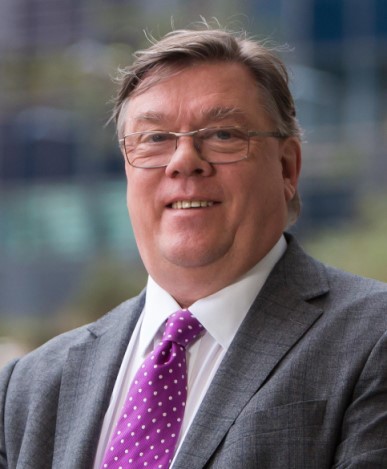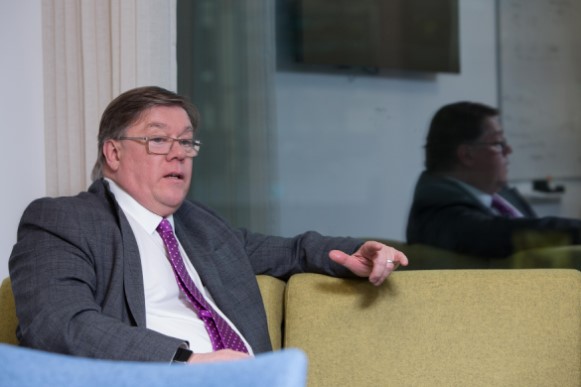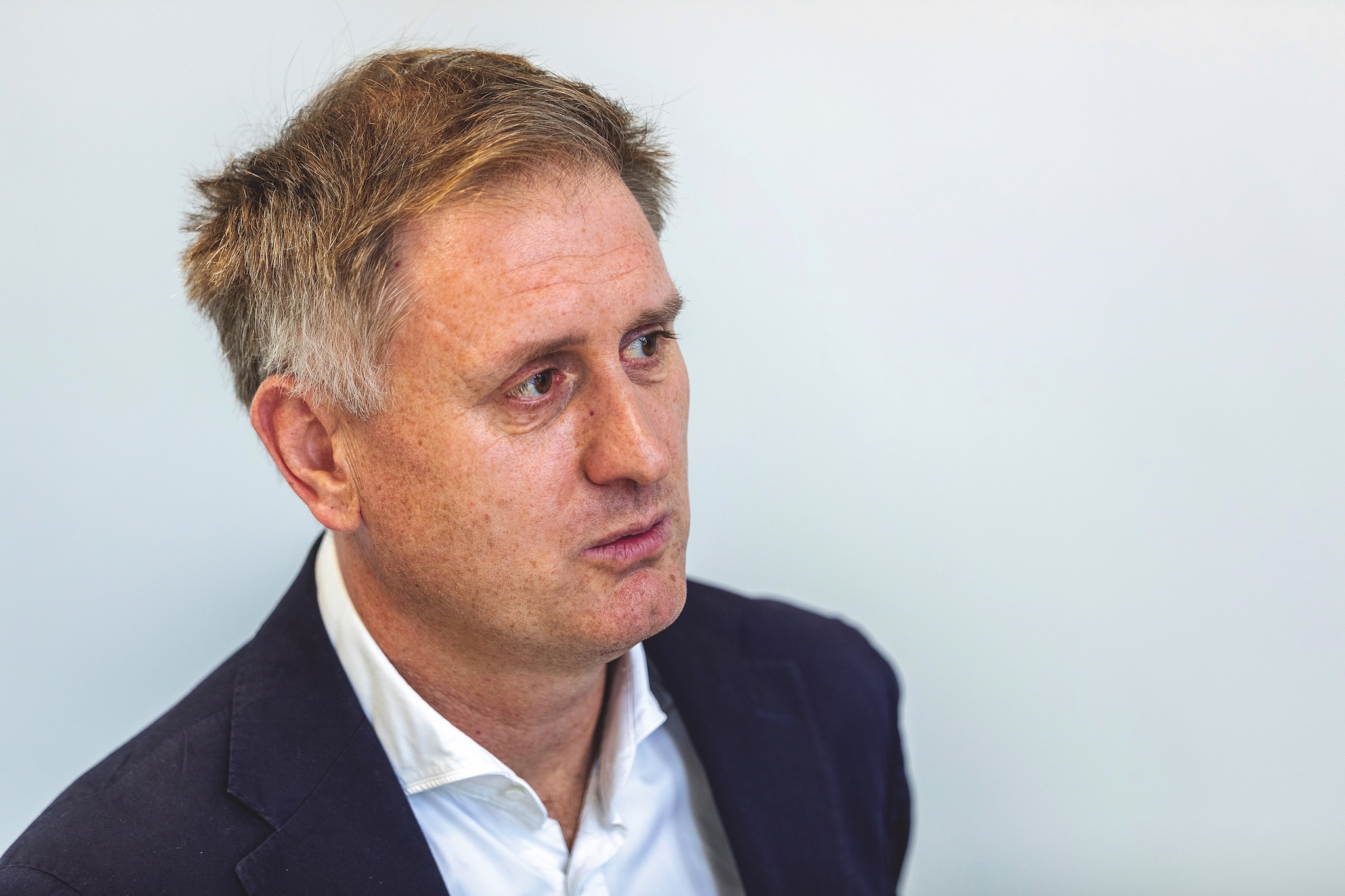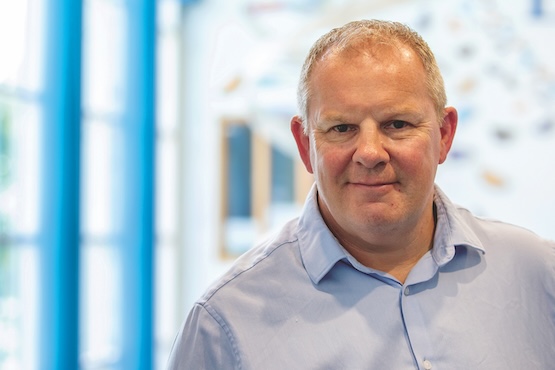Collaboration in the face of crisis: Birmingham and Solihull’s COVID-19 response

Having overseen the merger that created Birmingham and Solihull Clinical Commissioning Group, chief exec Paul Jennings spent two years managing a shift from a contracting to a collaborative culture. Then COVID-19 arrived – giving the city’s health and care managers just weeks to transform services. Matt Ross reports
As health and care managers explore how to integrate the services provided by NHS trusts, clinical commissioning groups (CCGs) and councils, says Paul Jennings, “we’ve spent the last few years going to endless presentations about how they redesigned health services in Christchurch.” It’s a great model, he adds – but New Zealand’s public servants did receive a hard push: “They had an earthquake, and two of their hospitals fell down.”
Now the UK has its own crisis to address. “COVID-19 is our earthquake,” says Jennings, noting that health professionals have very few tools with which to combat the highly-infectious disease. “All we’ve got is paracetemol, oxygen and washing your hands,” he says. “That’s all we’ve got in our armoury – end of. Which is pretty scary.”
As chief executive of Birmingham and Solihull CCG, Jennings has spent the last three years working to promote collaboration between health professionals in the UK’s second city. And coronavirus, he believes, has both accelerated that work, and demonstrated its importance: the close working relationships forged between health bodies have supported a “system response to COVID-19,” enabling the partners to radically reshape services over a period of weeks. “This crisis has made us work a lot faster,” he comments. “A lot of the things we’ve been dabbling in have suddenly gone at light speed.”
Those partnerships date back to 2017, when Jennings arrived in an interim role to steer through through the merger of three CCGs: Birmingham CrossCity, Birmingham South Central, and Solihull. By April 2018 he led the largest of England’s GP-led commissioning bodies, with a budget of nearly £2bn annually and 1.3 million people on its GPs’ books.
Conurbation-wide care
The merger, he explains, was designed to align the CCG’s boundaries with those of University Hospitals Birmingham NHS Foundation Trust – itself the product of a merger between two trusts, completed on the same day the CCG was born – and two council areas: Birmingham City Council, and Solihull Metropolitan Borough Council. “Given that we effectively have a single acute provider for the population we look after, it was felt to be really important that we operate at the same scale,” he says. “And having a single commissioning voice that works with the single commissioning voice of the city council is quite powerful; the same with Solihull.”
The CCG’s boundaries also align with those of the Sustainability and Transformation Partnership (STP), which Jennings heads – so across Birmingham and Solihull, there’s a common footprint for strategic leadership of the trusts, CCG, councils and STP. “When we have chief executives’ meetings, there are nine of us in the room,” he comments. “That’s everybody you need to make a decision at that level – which is quite powerful.”
This represents a sharp break from the past for Birmingham, which has long struggled to achieve the level of city-regional collaboration seen in other areas – most notably Manchester. “Birmingham has a pretty chequered history in terms of its ability to get its act together,” Jennings concedes. And it was the prospect of helping to build strategic leadership across the city on health issues that attracted him to the job, following his retirement in 2016.
“This is my city, where I was born and have lived most of my life,” he comments. “The opportunity to work on my own patch was very powerful.” His interim status lasted until February 2018: “I constantly said: ‘I’m not stopping, I’m just the interim’,” he recalls. “Then my wife – who, I must admit, wasn’t entirely pleased that I’d come back to work – said: ‘Why don’t you stay? You’re obviously enjoying it’.” He didn’t need asking twice: “I’d always thought that I’d like to finish my career with one big hoorah in Birmingham, and here it is!”
That last big hoorah is, thanks to COVID-19, proving rather bigger than expected as Jennings helps to address the most severe public health crisis in a century. When the virus arrived, the CCG quickly moved to remote working: “Of over 300 staff, 130 have been deployed to other organisations – people have volunteered to return to clinical practice or help out elsewhere – and the rest of us are working from home,” he says.
Meanwhile, senior leaders moved to prepare health and care providers for the coming deluge – holding daily calls at chief executive level to coordinate action. “We worked together to create space in hospitals for the number of patients we anticipated: at one point we had 700 empty beds in Birmingham and Solihull, which is unprecedented,” says Jennings. “And we put together a list of the vulnerable and shielded, cross-checking the data. We all had different information, but now we’re reasonably confident we’ve found all the people we need to support: we couldn’t have done that without mutual trust and information-sharing.”
Neighbourhood-level networks
As the city’s commissioners and providers moved from COVID-19 preparation to the response phase, the work carried out under the STP strategy has looked ever more prescient. The strategy had three top priorities – starting with children, maternity and adolescence. In this field, the focus was immunisation. “We’ve got quite low immunisation rates, particularly on MMR,” he comments. “People will now be much more responsive to that as an issue.”
Second, the STP has concentrated on developing both early intervention services to keep elderly people out of A&E, and better care pathways as they leave hospital. Working with Birmingham Community Health NHS Foundation Trust and the council’s social care team, its goal has been to ensure that discharged patients “don’t go routinely – as they did – to care homes and nursing homes, because that’s the least best option for everybody,” he says.
Key to this work was the development of primary care networks (PCNs), operating at the neighbourhood level of 30-50,000 GP patients; as GP surgeries come together, Jennings adds, many of these are now covered by a single practice. “And we’ve got an agreement with the community trust, the mental health trust [Birmingham and Solihull Mental Health NHS Foundation Trust], and adult social care that they will map their management structures onto those PCNs. So you’ve got primary care, community services, mental health services and adult social care services all working together on the same patch,” he explains. “That’s a powerful recipe.”
As coronavirus loomed, PCNs arranged to “tier” GP practices – with some delivering services to patients with no known risk of corona; some seeing those with unidentified respiratory issues; and “some ‘red’ sites for patients who we’re quite confident have COVID-19, and we want to keep out of A&E.” And each practice has been given sole responsibility for conducting home visits and treating care home residents across a set of addresses, minimising the number of GPs visiting each residence and thus cutting the risk of transmission.
Traditionally, Jennings explains, GP surgeries have been reluctant to see their patients receive services from other practices – but the need to squeeze infection rates has blown away such territorial concerns. “GP practices are to some extent competitive businesses, so to have them working together is a huge step,” he says. “I thought we might get here in five years, but we’ve done it in three weeks. This is pretty radical stuff for people who were operating in competition with each other.”
Digital developments
Third, for adults the STP had “taken urgent care as our focus – and we’re particularly interested in a ‘digital first’ approach,” he explains. The CCG had created an app to triage patients, with the goal of diverting them from GP surgeries to appropriate care – providing both information and advice, and referrals to clinical services such as physiotherapy and oncology.
If planners were creating the primary care system from scratch, Jennings comments, “you wouldn’t design it this way, would you? You’ve got the most highly-trained, most expensive people in the system – the GPs – providing the first point of access. Our goal is to use digital to get people to the right place on their first contact: we could take a lot of the pressure out of the system.” The app is now proving helpful in diverting demand away from primary care, while GPs have rapidly shifted to remote consultations: “They’re now triaging patients, and 90% of consultations are online,” he says. “We were working towards that, but we’ve done it almost overnight.”
Meanwhile, the city’s health bodies have introduced an online “COVID-19 care assistant: people can do a symptom check, have a live chat, and get a video consultation if they need it.” The system uses artificial intelligence technologies, he adds, providing “an important tool in making sure people get to the right place, helping to take the pressure off GPs.”
 “This is my city, where I was born and have lived most of my life. The opportunity to work on my own patch was very powerful.”
“This is my city, where I was born and have lived most of my life. The opportunity to work on my own patch was very powerful.”
In the longer term, Jennings argues that digital technologies will help address the UK’s shortage of doctors – particularly if other health professionals are trained to take on some of GPs’ current work. “It’s a lot quicker to educate a nurse to be an extended role prescriber than it is to grow a doctor,” he comments. And the opportunity to provide advice remotely via a digital platform, rather than taking the traditional route of joining a GP partnership, may also help retain doctors within primary care. “The vast majority of new GPs don’t want to buy into partnerships and stay there for 30 years,” he says, adding that triaging apps could “help get us to a point where a lot of the stuff that GPs don’t need to see is filtered out, so they only see the interesting stuff. That makes for a more satisfying job.”
Building a platform for partnership
Asked what helped the newly-merged CCG to get off to a good start in 2018, Jennings emphasises the importance of getting governance right. The board is split three ways between executives, independent non-execs and GPs, he explains: “That makes for a big board, but it’s what’s needed to keep a balance in the organisation. Although we’re operating at scale, we’re still trying to make it clinically-driven.”
Careful consultation was also important to the merger, which attracted little opposition. And as the organisations came together, Jennings involved staff side at every stage – ensuring that the merged CCG had a union recognition agreement (a significant upgrade: two of its predecessor bodies had relied on staff councils), and putting a union rep on each of the matching panels tasked with allocating employees new roles. During the merger every staff communication was checked with staff side before distribution, and Jennings has created a Workforce and Operational Delivery Group to feed unions’ views on HR and workforce development issues into senior management.
Only one boundary issue now hampers collaboration between GPs, trusts and the two councils across the Birmingham and Solihull area. In June, the GPs of NHS Sandwell and West Birmingham CCG – which is part of the neighbouring Black Country STP, but covers a chunk of Birmingham City Council’s area – rejected a proposal to split their CCG, adding eastern practices to Jennings’ CCG while those in the west merged into a new Black Country CCG. “People don’t generally want to vote for change,” comments Jennings.
Nonetheless he’s had “very good conversations” with Paul Maubach, the accountable officer for the four CCG’s to Jennings’ west – and as those CCGs move towards integration, he suspects “there may be another set of conversations to be had with those GPs. We’ve always been clear that we – and every organisation in this STP – think it would be much more effective if West Birmingham were more fairly and squarely part of the Birmingham system.”
From contracting to collaboration
Over the new CCG’s first couple of years, Jennings concentrated on reorienting its staff towards collaboration with health partners – replacing the focus on contracting introduced during Andrew Lansley’s 2012 reforms, which saw CCGs as trusts’ hard-bargaining customers. “Contracting isn’t going to work. It doesn’t add value: we spend millions of pounds checking people’s homework, and nothing changes as a consequence. I think a lot of the contracting stuff needs to wither,” says Jennings bluntly. In future, he’d like NHS trusts to be “doing all the counting and checking. It’s their business: they need to understand what they’re doing – and I need to be grown-up enough to accept that they’re telling me the truth.”
In today’s health services, he continues, “we’re trying to establish a set of adult relationships. As commissioners, we’re becoming more strategic. We want to focus on outcomes, on quality, on performance; and we’re not going to tell people how to do their jobs. Rather than giving people instructions, then ticking them off and sending them a letter if they don’t do it – which has been the slightly adversarial contractual system – the business becomes much more about the relationships and the people: getting folks to work together.”
Pre-corona, he adds, it had been tricky to “get people – some of whom have been working in what they would describe as a ‘market’ for 30 years – suddenly to work in a system.” Too often, people were given an opportunity to “do something that’s really good, but wouldn’t do so because it would save someone else money and cost them. We have to persuade our colleagues to participate in a system approach, and – to some extent – to sort out the money afterwards.”
And here, COVID-19 has proved very persuasive. During the current crisis, says Jennings, “we’ve had almost no conversations about money at all. We were in the closing stages of the ritual dance to set up next year’s contracts when this hit, and we’ve parked that: we’re making standing order payments so that trusts can pay their staff, and that’s as far as we’ve got. Working out our response to this issue is the first, second and third things on our list.”
What’s next?
Looking back over the development of Birmingham and Solihull’s health provision, Jennings comments that “my role as system leader in the STP has been to bring people together as often as I can, building trusting relationships so we can have frank conversations and make some of those difficult decisions.” And when coronavirus struck, that platform of strategic, collaborative leadership proved invaluable: health and care leaders could rapidly free up hospital beds, identify and protect vulnerable households, introduce system-wide management of GP practices, and fast-track existing programmes to roll out triaging apps and digital consultations.
Asked how the UK can extract itself from the current crisis, Jennings points to the approach adopted by Far Eastern nations such as Korea and Singapore: “The issue of testing will become far more important, because we’ll need to move to a system like that used by other countries – which is rigorous testing, faultless contact tracing, and isolation” of people who’ve been exposed until they test negative. “That will be the only way out of this until we have a vaccine, but we don’t currently have the resources to do it.”
There is, he emphasises, no quick fix: “This isn’t a sprint, but a marathon followed by another marathon followed by another marathon,” he says. “We’ll have to live with it for quite a long time.” But when the UK finally does emerge from the current crisis, many health and care systems – like Birmingham and Solihull’s – will have taken huge strides in integrating, coordinating and digitising services.
“One of the things we’re starting to talk about is the recovery: trying to retain the positive steps we’ve made, and carry them into a redesigned healthcare system,” he concludes. “We don’t want to go back to what we had before, when 60% of traffic through A&E should never have been there. We need to hang onto those gains.”
Related News
-

“Showing kindness and trust creates a virtuous circle – people respond well to that”
As chief executive of Suffolk and North East Essex, one of England’s most highly rated integrated care boards, Ed Garratt has pioneered a radically different approach to leadership – one based around kindness, trust and putting down deep roots in local communities. He talks to Healthcare Manager’s Matt Ross.
-

We need to give managers reasons to join the profession — not risks to avoid
Steve McManus’s work developing the leaders and managers the NHS needs for the 21st century has caught the eye of national leaders. The Royal Berkshire trust chief executive talks to Matt Ross about transforming services, developing leaders and the right way to regulate the management profession.
-

Interview: Dr Phil Hammond, doctor, comedian, health campaigner
Doctor, comedian, broadcaster, writer, health campaigner and politician manqué, Dr Phil Hammond is now drawing up a manifesto to rescue the NHS and boost the nation’s health. On the eve of a watershed general election for the UK, he spoke to Healthcare Manager’s Matt Ross.